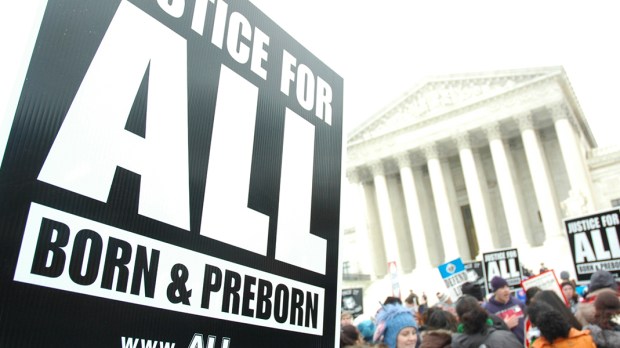Lenten Campaign 2025
This content is free of charge, as are all our articles.
Support us with a donation that is tax-deductible and enable us to continue to reach millions of readers.
“Today’s decision can only cause one to wonder which cases the court will overrule next.” Justice Stephen Breyer said that last month while dissenting from a Supreme Court decision overturning a precedent on the subject of state sovereignty. Clearly, though, among the precedents he now sees in jeopardy is Roe v. Wade, the court’s 1973 decision legalizing abortion.
Breyer, a comparatively low-profile member of the Supreme Court’s four-member liberal bloc, is hardly alone in that. Speculation about the future of Roe has reached the boiling point. States throughout the country, with Alabama leading the charge, have adopted laws imposing tough new restrictions on abortion even as other states, notably including New York and Illinois, have enacted highly permissive laws to provide cover for abortion if Roe goes down and the issue returns to the states.
In fact, though, laws like Alabama’s barring abortion after the early weeks of pregnancy may not be the basis for the Supreme Court’s eventual decision, whether that be to uphold Roe v. Wade, overturn it, or, as seems most likely, do something in between. That distinction is likely to go instead to cases coming before the court that could send the fight back to the states, such as one or more of the state laws chipping away incrementally at abortion that are now farther along in the court system.
There was a hint of what that might look like when the court in an unsigned opinion approved part of an Indiana law on abortion while expressing no opinion on a second, more restrictive part of the statute.
The provision approved by the court May 28 requires “dignified” disposal of the remains of aborted fetuses by burial or cremation rather than disposal as medical waste. Indiana’s appeal to the Supreme Court said the measure sought to show respect for “a partially gestated human.”
The second section of the law would ban abortions performed because of the sex or race of the fetus or because of fetal disability. The Supreme Court’s unsigned opinion noted that only one court so far has taken a position on such a law — the 7th Circuit Court of Appeals, which ruled against it — and the Supreme Court customarily waits until at least two lower courts have had their say.
Almost certainly, though, the court will soon accept some other abortion-related case. Two such requests are now pending. One concerns a Louisiana law requiring that doctors who perform abortions have hospital admitting privileges. The other involves another Indiana measure requiring that, unless she declines, a pregnant woman receive an ultrasound image of the child and hear a recording of the fetal heartbeat at least 18 hours before an abortion.
Pro-life firebrands might prefer that a law challenging Roe v. Wade head-on be the one the Supreme Court considers, but there’s a strong argument for the view that pro-life objectives would best be served if that doesn’t happen.
A case involving greatly expanded state leeway to circumvent Roe without flatly reversing it seems more likely to bring Chief Justice John Roberts on board with his four conservative colleagues — Justices Thomas, Alito, Gorsuch and Kavanaugh — than does one calling for an unconditional overturning of the earlier decision. Justice Breyer — along with Justices Ginsburg, Sotomayor and Kagan — will oppose either outcome.
The practical result would be much the same whether Roe v. Wade is reversed or left intact but toothless: The battle over abortion will go on at the state level. But pro-lifers no longer would have to wage their fight with the albatross of Roe around their necks. And that would be enormous progress.

